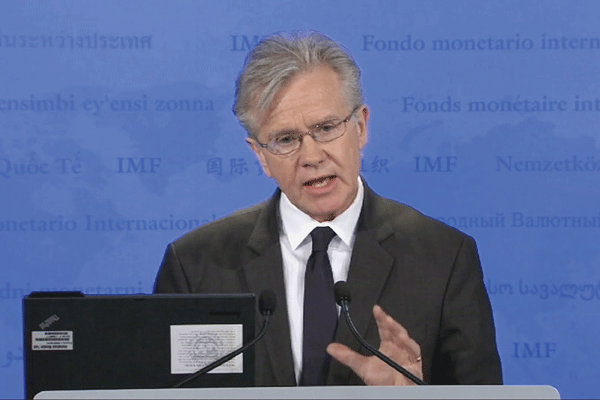
The ratification by the International Monetary Fund (IMF) executive board for the removal of remedial measures on Zimbabwe should open a new chapter for Zimbabwe’s economy.
guest column: LEARNMORE ZUZE

It also strongly calls for the opening of another chapter and concerted effort in good governance by government.
Without a strong will, genuine resolve and commitment to deal with the grand matters that have stalled progress and held this nation captive for almost two decades now, the monetary clearance by the IMF and the painstaking effort invested in the defrayal of the international debt is absolutely hollow and devoid of meaning.
The traumatic journey that this nation has travelled in the absence of assistance from the multi-lateral lender should be a strong reminder of the need for proper governance.
Zimbabwe, in the last decade and a half, could not qualify for financial and technical assistance in most aspects and had its doors with other lenders closed in its face.
As a result, the grave scars in a world fast-becoming a global village are clear on the Zimbabwean economy.
Last month’s clearance by Zimbabwe of the outstanding $107 million has seen the country having its rights and benefits as a legitimate member of the international financier restored once more.
- Chamisa under fire over US$120K donation
- Mavhunga puts DeMbare into Chibuku quarterfinals
- Pension funds bet on Cabora Bassa oilfields
- Councils defy govt fire tender directive
Keep Reading
But before we get tickled, it behoves the national leadership to seriously start on a genuine reparative path.
There are marked behaviours by government since 1980 that have plunged the country into an unenviable situation.
Zimbabwe is ranked among the top 10 worst habitable places in Africa despite the absence of war.
Unless and until these profligate behaviours are ruthlessly weeded out, the country is going to the same place.
There is no point celebrating the ending of a debt when we are going to engage in the very behaviours that got us into the very debt; it’s a waste of time, effort and resources.
Zimbabwe, as a country, needs to get certain things straight in order to step out of this economic rut.
There are paths that have proven beyond any shadow of doubt that the country is doomed if it continues on them.
Reactionary and populist policies have crippled what was once the southern region’s reserve economy.
The inefficacy of political rhetoric, grandstanding, corruption, cronyism, superstition in governance and the rewarding of mediocrity, among many other harebrained ideas, have proven to be a cocktail for disaster.
Add to that, corporate malfeasance and a culture of unbridled expenditure on air travel and ludicrous perks has bled this educated nation dry, serving only a handful; the looting of State coffers has not helped matters.
It is sad; the national cake can be shared equally, but only a few have the privilege today, prompting the question of whether the liberation struggle was a conduit for the perpetuation of injustice.
It is the mind of the leadership that is in urgent need of renewal if we are to act for the common good and ameliorate the suffering of millions.
It is time that leaders, the Executive in particular, learnt to forego sumptuous lifestyles and serve the people.
On the ground, today, it benumbs to learn that there is nothing that justifies the millions owed to the international lending institutions.
Zimbabwe is characterised by decaying infrastructure, a dying health sector, poor remuneration for the civil service and an underfunded judiciary system, to mention but a few.
And one wonders how these millions borrowed were used (read abused) given the topsy-turvy status of this country’s economy.
The fact of the matter is that the government needs to change its course; today the nation groans under the crushing weight of these humongous debts, which were used to fund foreign wars that did not benefit the ordinary Zimbabwean.
IMF clearance will only make sense if the government chooses a productive route and steps out of debt.
It cannot, at this juncture, be said that Zimbabwe is out of the woods. Clearing the debt was merely the first step.
The giant and all-important step, like the lending institution insists, is the implementation of key reforms.
IMF spokesperson, Gerry Rice noted that Zimbabwe was still miles away from accessing new loans.
“…the clearance of those arrears with the World Bank, the African Development Bank (AfDB), the European Investment Bank and others would be an important consideration for us in terms of moving forward with any support for Zimbabwe,” he said.
Clearly, from that statement, Zimbabwe is still in the doldrums. The IMF, to a huge extent, is justified in demanding that no money should be availed to Zimbabwe until dues are paid to other organisations like the World Bank and the AfDB.
Also, the IMF insists they want the government to show undoubtedly that measures like strong structural and fiscal reforms are implemented in Zimbabwe.
The no-reforms-no-money stance might sound harsh and unfeeling, but this is precisely what the government needs to ponder on.
It is logical; before getting excited with the prospect of borrowing again, Zimbabwe must repay all its debts and implement key economic reforms.
Learnmore Zuze writes in his own capacity. E-mail: [email protected]











